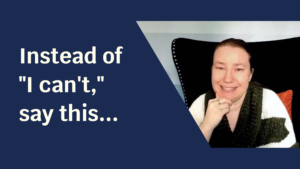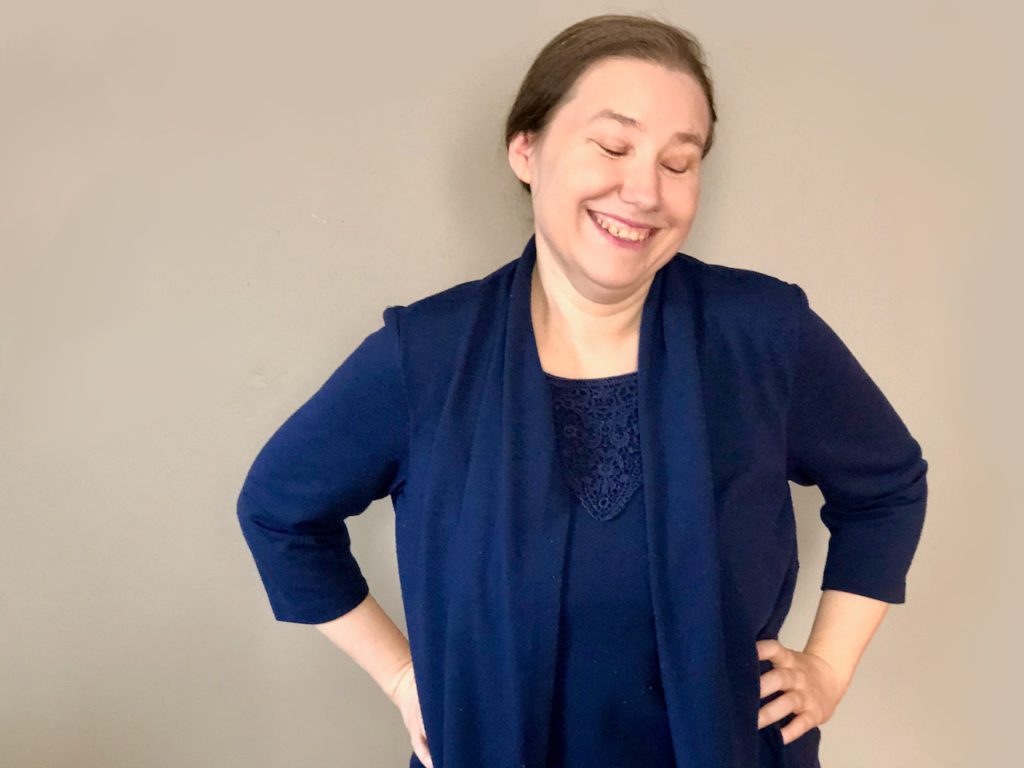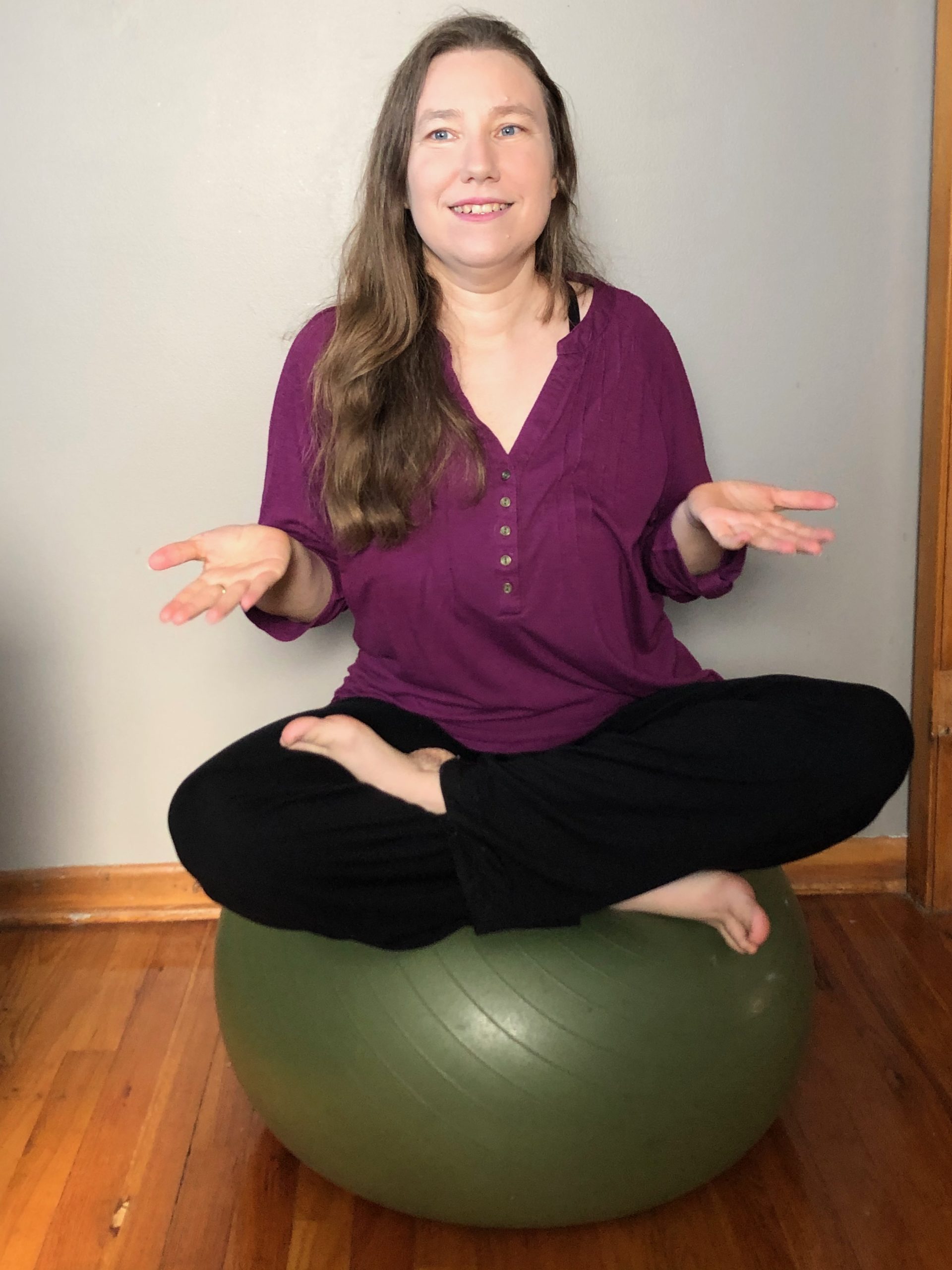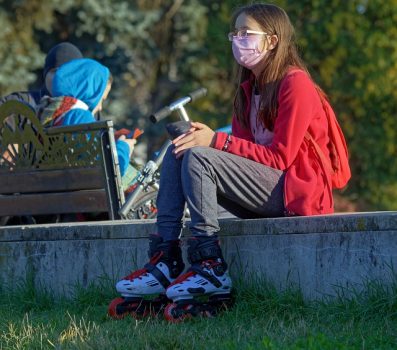
Instead of “I can’t,” say this…
When we say we can’t do something that we actually can do, it may limit our ability to solve the real issue. Here’s a way to take back control.

Let’s start with a few labels, which are woefully incomplete but may start to give you an idea of how I function in the world.
I’m Autistic (dx at 35). And ADHD (self-dx at 40).
I’m highly sensitive (figured that out at 36) and introverted (I’ve known that forever, but I only let it matter in my 30s).
I have sensory processing differences (Irlen Syndrome dx at 31 and auditory processing dx at 32).
I’m physically disabled and live with chronic pain from Ehlers-Danlos Syndrome (dx at 40 after decades of wrong dxs), vestibular migraines (dx at 42; turns out it isn’t POTS after all), and likely MCAS (still figuring this out).
I’m in recovery from C-PTSD from Autistic gaslighting and education/medical trauma. That’s mostly healed, but still comes around now and again.
Plus, I’m asexual and female of center (but don’t entirely define as a woman (still figuring that out)).
I’ve also experienced long periods of extreme poverty, anxiety, depression, alexithymia, and multiple bouts of Autistic burnout (and none of these are part of my life anymore).

Each of these was one of those huge “aha” moments in life. They changed the way I saw myself. The way I related to the world. The way I thought about other people.
But when I figured out I’m Autistic, it changed everything.
I looked back at my life and so much finally made sense. My struggles and my easy accomplishments. Why this happened, and that. It all finally fit into place.
It was like a get out of jail free card. It was permission to not keep trying to “fit in,” to “be normal,” to do things the “right” way anymore. I gave up trying to do things the way everyone said I “should,” and experimented with new options. Tried new ideas.
I sought help, but sadly, found almost nothing for later dx Autistic adults. So I figured out things for myself through extensive research and trial and error.
It was a gradual process, and frankly, I’m still letting go of old ways of doing things and internalized ableism and all that, but the process is well underway.
Here’s a bit of my story…
I was the kid who literally hid behind my mom’s skirts. A teacher saying, “find a partner” was the stuff of nightmares. I was good at academics, but struggled in classrooms when kids talked over each other. I was a voracious reader, but slow, and could do math in my head but not on paper. I was tired all the time and injured easily. And at the end of every school year, I’d get sick for a week. It was like my body had saved up all the stress I couldn’t deal with and let it out in one burst.
Even when things went okay, I always felt like an outsider. I talked differently, took everything more seriously, and was the last to get a joke.
I tried to fit in, but it never completely worked.
So I told myself I didn’t care what anyone thought and took pride in just being me. But I pissed people off because I wouldn’t let things go, or would accidentally offend someone and had no idea why what I said was bad. And no one would explain it to me, they just complained about my “lack of tact.”
Even when I did have friends, I assumed they only let me hang around to be polite, not because they actually liked me.
Social skills aside, I was intelligent and had other marketable skills, so when I graduated college I easily landed what I thought was a good job, but which I would now describe as “extrovert friendly.”
I forced myself to show up daily for almost three years, until I finally admitted how miserable I was, and they let me work from home. But I was already too close to burnout. Soon…


My comfy work-from-home job went away because I stopped showing up. To a desk, a whopping 10 feet from my bed. Because, people. On the phone. For eight hours a day (in theory; I never actually managed that). I felt like the phone had sucked all my energy out through my ear. I was beyond exhausted, barely left the house, ignored everyone, avoided pretty much everything. Until that stopped, too.
I didn’t need to avoid or ignore anymore, because I was numb to the world. I pretty much didn’t get out of bed for a year. Ran down my savings and ran up debt to pay the bills. Ignored kindly offers to pay for doctors or therapy. Moved in with Mom. I didn’t understand what was wrong with me, I just knew I couldn’t handle anything anymore. Even help.
All the dreams I had for my life were crumbling and I had no idea how to put myself back together, or if that were even possible. I felt lost and confused. Alone. Broken.
I did eventually drag myself back into the world, did a bunch of self-reflection, promised to take better care of myself, retrained as a teacher and got a good job in a good high school, and guess what happened? A few years later, I burned out again.
The second time wasn’t nearly so bad (I only shut down for a few months), but it was bad enough to jolt me out of my life and drive me to find real answers.
I got my autism diagnosis the next year, which finally explained why I kept struggling in some areas and was really fabulous in others. Yes, I really am different, but I’m not broken.
After that, I went through several years of deep personal reflection, and found a great therapist who helped me undo decades of trauma-by-cultural-gaslighting, dismantle my depression, root out entrenched thought patterns that were hurting me, and I learned to be myself – and figured out who the frig’ that was apart from the mask I had constructed for the world (mostly without realizing it).
I also explored a lot of my sensory differences, and realized they had been affecting me (since birth) far more than I ever realized. I let myself be introverted and let that be okay. I re-parented my highly sensitive self and worked through a lot of repressed anger and regret about what could have been if we had only known earlier.
My life now, eight years later, is so much better than my wildest dreams, because in all those other scenarios (except the hermitage in the woods daydream), I wasn’t comfortable either with myself or with other people. Now I am. And that’s getting better every year.

After several years of working through my own issues, other people started asking me for advice, referring their friends and relatives to me, and found talking to me helpful. I started thinking I could offer others some of the help I had wanted and sought so desperately and yet didn’t get.
Now I help other Autistics through the transition of self-discovery and making a life that fits them better, even in a society that doesn’t.
And I advocate for Autistics helping Autistics and positive acceptance among the wider society.
Honestly, the Single. Biggest. Thing. Was that I accepted that I tick differently than a lot of people, and that that’s OK. Truly. It’s OK.
And I’ve found strategies for helping the people around me be OK with that as well.
Other things include:

If you really want a better future, you can’t just do the same things you’ve always done, but harder. It takes finding a better way.
It also doesn’t happen all at once. It takes lots of little steps. Turtle steps.
*I’ve been super picky about what training, courses, and education I subject myself to, since so much is built on models that are part of old systems I am actively trying to move away from.
What does my life look like now?
I’m sustainably self-employed at this fabulous gig, which feels meaningful without overwhelming my ability to function.
I take the time I need to recharge on a daily, weekly and seasonal basis.
I’ve curated my life to support my sensory needs and to give me enough reserves to deal with the unexpected when it happens (it always will) and for those times in life when everything gets hard all at once.

I have several close, spill-your-guts-to friends. And a whole bunch of other people I consider real friends or good relationships.
I’m much better at communicating what I need in ways that people respond to positively. And I no longer believe that voice inside me that says that asking someone for a small accommodation is being “needy“ or “too much“ or that it will damage our relationship forever.
Sometimes my stomach still does a little flip before asking the grocery store clerk where to find some item, but now I will ask rather than spend ages searching fruitlessly with increasing frustration and resentment.
Although I don’t go to the grocery store much. I’ve discovered I can trade computer help for delivery service from my roommate. We take care of each other.
My social misunderstandings are few and far between, and no longer trigger massive shame or panic. And no, I’m not masking. Much.
And I talk to neurowonderful people, often strangers, almost every day, and feel good about it. Which, frankly, surprises the hell out of me as much as anyone, as I never thought I would want to talk to people (especially new people) for a living, but now I really do.
And, shock of shocks, when I have a really good conversation with a friend, or a really good session with a client, it gives me energy! I LOVE that feeling!
Psychology, neurobiology, astronomy, space history, German language and history, and all things Star Trek.
I’ve always scored high as an INTJ, but in the last few years I’ve been pegged as ENFP. I know, right?
Putting away the dishes. It’s a sensory thing. All that clinking of dishes and bowls and silverware against each other, ACK!
It was my “get out of jail free card,” letting me let go of expectations and be myself – once I figured out who that was, LOL.
I love traveling, but don’t love all the changes in living arrangements, so I moved into a van for three years after figuring out I'm autistic to roam the country while working out my internal crap. This work I do now is the direct result of that very fruitful wandering.
I’ve also traveled to 14 countries, and survived hospitals in two of them.
Let’s see…I have shorn a sheep. Yes, that’s the correct past tense. Or I could say, ’I shore a sheep in Greece.’ Or ’I did shear that shaggy sheep.’ I also like conjugating irregular verbs.
It makes me intensely happy to solve a difficult riddle. Preferably without clues.
Beginning sentences with conjunctions (oh, the horror) and ending them with prepositions (hide the children!). I reject strict adherence to classical Latin grammar rules in modern English.

Schedule a Clarity Session to meet and see if we’re a good fit.
I get it. It’s OK to take a while getting comfortable with me.
Or not.
In the meantime, take a look around.
No worries. I’m not a good fit for everyone, and that’s OK.
And if now’s not the right time, that’s OK too.
You’re still welcome to lurk, and to all my freebies.

When we say we can’t do something that we actually can do, it may limit our ability to solve the real issue. Here’s a way to take back control.

Here are 20 examples of masking in real life. Do you do any of these things? If you resonate with several of them, you might be masking.

My long-awaited autistic burnout recovery course is now available! We start September 7th, 2004. Here’s a brief overview and links to learn more.
We don’t spam or sell. Promise. Unsubscribe at any time.
Read our privacy policy here.
Privacy Policy Heather’s Boundaries (T&C)
The information on this site is not intended or implied to be a substitute for psychotherapy, medical advice, diagnosis, or treatment.
© 2020-2024 Autism Chrysalis LLC.